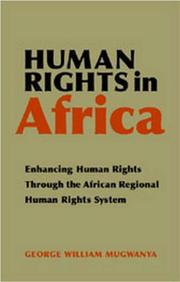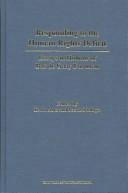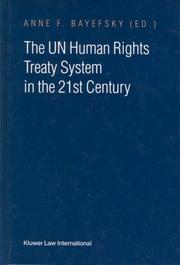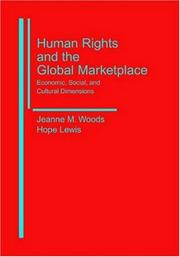| Listing 1 - 10 of 25 | << page >> |
Sort by
|
Book
ISBN: 9789004480087 9789041118325 Year: 2002 Publisher: Leiden; Boston : Brill | Nijhoff
Abstract | Keywords | Export | Availability | Bookmark
 Loading...
Loading...Choose an application
- Reference Manager
- EndNote
- RefWorks (Direct export to RefWorks)
Ever since its creation, the United Nations has sought to protect as well as to promote human rights. Those who campaigned for decades for the establishment of the post of High Commissioner for Human Rights did so in the hope that the High Commissioner would spearhead the efforts of the United Nations and the international community to protect those at risk or whose rights are being violated. How has the High Commissioner contributed to international protection since the establishment of the office in 1993? This book, the first-ever written on the office since its establishment, presents the protection role of the High Commissioner. It argues that limited protection functions are carried out by the Security Council, the Secretary-General, the Commission on Human Rights and its special procedures, and the High Commissioner. However, international protection is still in its infancy and much more remains to be done to bring about a protection system that effectively anticipates and prevents gross violations, contributes to mitigation and cure, and facilitates remedies and compensation. This is a valuable pioneering work in the area of the international protection of human rights.
Book
ISBN: 9004139338 9004531998 Year: 2004 Publisher: Leiden ; Boston : Brill | Nijhoff,
Abstract | Keywords | Export | Availability | Bookmark
 Loading...
Loading...Choose an application
- Reference Manager
- EndNote
- RefWorks (Direct export to RefWorks)
Contrary to popular belief, there is a vast body of law dealing with human rights in Africa in existence today. The first priority at the moment is consequently not the adoption of new norms, or the creation of even more structures, the most immediate challenge lies in making the existing structures work and ensuring compliance with the norms already accepted by African societies. Access to the relevant material constitutes a necessary precondition for any other gains in this field. The aim of this reference work is, therefore, to make African human rights law accessible to all those involved in or interested in human rights law on the continent, in order to strengthen its impact. Primary documents are introduced and reproduced and presented in a coherent framework. The main institutions - public and private - dealing with human rights in Africa are identified and discussed. Comprehensive overviews of the international human rights legal regimes applicable to Africa, as well as country reports are provided. Access to this body of law will enable judges, practicing lawyers, academics and other researchers, as well as law reformers, NGOs, activists and students, to both ascertain and assert these rights. It will also serve to ensure the development of a stronger indigenous African human rights jurisprudence, rooted in local experience, history, culture and practices. This book consequently tries to contribute towards documenting, systemising and anchoring the African human rights system. This publication replaces and updates the earlier Human Rights Law in Africa Series, which appeared on an annual basis from 1996 to 1999. In order to make the publication accessible in Africa, the Centre for Human Rights and the Raoul Wallenberg Institute in Sweden have undertaken a targeted distribution campaign on the continent. The print edition is available as a set of two volumes (9789004138810).
Book
ISBN: 9004139346 9004532005 Year: 2004 Publisher: Leiden ; Boston : Brill | Nijhoff,
Abstract | Keywords | Export | Availability | Bookmark
 Loading...
Loading...Choose an application
- Reference Manager
- EndNote
- RefWorks (Direct export to RefWorks)
Contrary to popular belief, there is a vast body of law dealing with human rights in Africa in existence today. The first priority at the moment is consequently not the adoption of new norms, or the creation of even more structures, the most immediate challenge lies in making the existing structures work and ensuring compliance with the norms already accepted by African societies. Access to the relevant material constitutes a necessary precondition for any other gains in this field. The aim of this reference work is, therefore, to make African human rights law accessible to all those involved in or interested in human rights law on the continent, in order to strengthen its impact. Primary documents are introduced and reproduced and presented in a coherent framework. The main institutions - public and private - dealing with human rights in Africa are identified and discussed. Comprehensive overviews of the international human rights legal regimes applicable to Africa, as well as country reports are provided. Access to this body of law will enable judges, practicing lawyers, academics and other researchers, as well as law reformers, NGOs, activists and students, to both ascertain and assert these rights. It will also serve to ensure the development of a stronger indigenous African human rights jurisprudence, rooted in local experience, history, culture and practices. This book consequently tries to contribute towards documenting, systemising and anchoring the African human rights system. This publication replaces and updates the earlier Human Rights Law in Africa Series, which appeared on an annual basis from 1996 to 1999. In order to make the publication accessible in Africa, the Centre for Human Rights and the Raoul Wallenberg Institute in Sweden have undertaken a targeted distribution campaign on the continent. The print edition is available as a set of two volumes (9789004138810).

ISBN: 9789004478558 9781571052933 Year: 2003 Publisher: Leiden; Boston : Brill | Nijhoff
Abstract | Keywords | Export | Availability | Bookmark
 Loading...
Loading...Choose an application
- Reference Manager
- EndNote
- RefWorks (Direct export to RefWorks)
The author argues that although the Universal Declaration of Human Rights and the role the United Nations plays in promoting global awareness of human rights has had a positive influence in Africa, their institutional, financial and political impediments undercut the ability of a global system to address adequately the crisis in human rights violations occurring in Africa today. Using case studies from South Africa and Uganda, past difficulties in addressing human rights problems are analyzed and recommendations made for future methodologies including the creation of an African Court of Human and Peoples' Rights. Published under the Transnational Publishers imprint.
Book
ISBN: 9789004482272 9789024728053 Year: 1983 Publisher: Leiden; Boston : Brill | Nijhoff
Abstract | Keywords | Export | Availability | Bookmark
 Loading...
Loading...Choose an application
- Reference Manager
- EndNote
- RefWorks (Direct export to RefWorks)
Book
ISBN: 9789004481640 9789041101464 Year: 1995 Publisher: Leiden; Boston : Brill | Nijhoff
Abstract | Keywords | Export | Availability | Bookmark
 Loading...
Loading...Choose an application
- Reference Manager
- EndNote
- RefWorks (Direct export to RefWorks)
Since 1945, it is estimated, more people have perished as a result of gross human rights violations than as a result of war, yet we have little knowledge of why governments commit gross human rights violations. The present study, seeking to obtain an understanding of the causes underlying gross human rights violations, compares the human rights situation in a country where gross human rights violations are the rule (Guatemala) with the situation in a country where this type of violations does not occur (Costa Rica). The focus of the study is on the short-term sources within the political system which are perceived by those in power as a threat to their power and which trigger gross human rights violations. Furthermore, the long-term sources or background factors which set the stage and allow gross human rights violations to be perpetrated are analysed. The study concludes by highlighting the causes of gross human rights violations and briefly addresses how these violations are presently dealt with in Guatemala.
Human Rights (International Law) --- Human rights (International law) --- Human rights --- Human rights

ISBN: 9789004481497 9789041120212 Year: 2003 Publisher: Leiden; Boston : Brill | Nijhoff
Abstract | Keywords | Export | Availability | Bookmark
 Loading...
Loading...Choose an application
- Reference Manager
- EndNote
- RefWorks (Direct export to RefWorks)
Despite the existence of a wide range of human rights instruments and procedures, human rights violations still abound. The authors of this book address this so-called human rights deficit, and the possible responses to it, from various disciplinary angles and mostly in the context of development. They explore the reasons for the continuation of economic, social and/or political exclusion and human rights violations at large. They also present keys for redressing the human rights deficit. The role of law, and questions of universality, inclusion and exclusion are central themes in this book. The need to take up civil and political rights and economic social and cultural rights on equal footing is recognized by several of the authors, and so is that of bridging the public-private divide. Specific contributions address among others the importance of human rights training and education, the role of NGO's in a globalizing world, minorities, gender and women's rights, accountability of multinational corporations, and the problem of human trafficking.

ISBN: 9789004502758 9789041114150 Year: 2000 Publisher: Leiden; Boston : Brill | Nijhoff
Abstract | Keywords | Export | Availability | Bookmark
 Loading...
Loading...Choose an application
- Reference Manager
- EndNote
- RefWorks (Direct export to RefWorks)
Every United Nations member state is part of the human rights treaty system through the ratification of at least one of the six major human rights treaties, rendering universal participation a reality. For human rights victims, the treaty system is of central importance because international legal standards may offer benefits which political fora may not: the potential to generate remedies, attention, accessiblity. At the same time, the implementation mechanisms associated with the human rights treaties were designed at a time when the argument that international interest in human rights was an interference in domestic jurisdiction was at its peak. The challenge for the 21st Century is to move the theory of universality of international human rights standards towards effective implementation of human rights obligations. This book is a major contribution to the effort to focus attention on effective implementation of the human rights treaties. The contributors examine the major implementation shortfalls of the UN human rights treaty system, and offer concrete recommendations as to where future implementations efforts should be placed. The contributors are in a unique position to formulate and share their insights. They are drawn from among all of the constituencies involved in the human rights treaty system: the treaty bodies themselves, the NGO community, the UN secretariat, regional human rights regimes, UN agencies, UN human rights actors from the Human Rights Commission, the judiciary and academia. The book also includes, as a unique resource, all of the major documents concerning the UN human rights treaty system: the text of the treaties, the text of all amendments, statistics on individual communications to the treaty bodies, the text of all meetings of the chairpersons of the treaty bodies, reports and commentaries submitted to the UN Human Rights Commission, recent resolutions of the Human Rights Commission and the General Assembly on the human rights treaties, reform proposals by the International Law Association, regional human rights instruments. In the words of Philip Alston, the author of the UN report on enhancing the long-term effectiveness of the UN human rights treaty system, Professor Bayefsky's work `.has been more systematic and comprehensive, and has continued over a longer period of time, than any other comparable sholarly work on the subject.' (March 2000) In this volume Professor Bayefsky has collected the views of a range of authors immersed in the contribution and welfare of the UN human rights treaty system in the 21st century. It is necessary text for all those interested in the future of the international protection of human rights.
Human rights (International law) --- Human rights --- Non-governmental organizations

ISBN: 9789004479982 9781571052742 Year: 2005 Publisher: Leiden; Boston : Brill | Nijhoff
Abstract | Keywords | Export | Availability | Bookmark
 Loading...
Loading...Choose an application
- Reference Manager
- EndNote
- RefWorks (Direct export to RefWorks)
Special adoption price: USD95.00/copy, 10 or more At a time of great change, turmoil, and contradiction in international human rights law and politics, authors Jeanne M. Woods and Hope Lewis have responded to the growing need for a classroom text that focuses squarely on economic, social, and cultural rights-"the neglected step-children of the human rights family"-and their intimate inter-relationship to civil and political rights. Students and instructors will find the results informative and provocative. Intended for use in law school, graduate, and undergraduate survey courses, as well as seminars on human rights, this book will be useful for teachers using both international and comparative approaches. The text is divided into four accessible parts: I. "Human Rights and the Global Marketplace: Discursive Themes" introduces the nature and scope of human rights discourse. II. "International Instruments and Their Implementation" takes students through an array of international and regional human rights treaties that address economic, social, and cultural rights. III. "Power, Politics, and Poverty: Structural Challenges to the Realization of Economic, Social, and Cultural Rights" addresses major controversies in, and barriers to, the realization of socio-economic and cultural rights. IV. "Comparative Approaches" is valuable for international human rights, comparative law, and comparative constitutional law courses. Throughout the book, the authors provide notes, questions, and further reading suggestions to stimulate classroom discussion, debate, and research. The volume also includes valuable appendices, with a bibliography of relevant texts and articles and a selection of NGOs that focus on these issues. Published under the Transnational Publishers imprint. Winner of the Notable Contribution in the Field of Human Rights Scholarship award at the US Human Rights Network National Conference in Chicago in April 2008.
Civil rights --- Human Rights (International Law) --- Human rights

ISBN: 9041117768 900447935X 9789041117762 9789004479357 Year: 2002 Volume: 9 Publisher: The Hague Kluwer law international
Abstract | Keywords | Export | Availability | Bookmark
 Loading...
Loading...Choose an application
- Reference Manager
- EndNote
- RefWorks (Direct export to RefWorks)
This volume, the result of an ongoing Nordic research project undertaken under the auspices of the Danish Centre for Human Rights in Copenhagen and the Raoul Wallenberg Institute for Human Rights and Humanitarian Law in Lund, examines the relationship and possible interaction between good governance and human rights. The contributors consist of academics and professionals with backgrounds in development studies, economics, law, political science, and sociology. Together they demonstrate the need for interdisciplinary dialogue and clarification of concepts, contents, and processes of realisation. While good governance is mainly pursued in a development context, it is a central message of the book that good governance guidelines ought to have universal applicability, affecting international organisations and public and private actors in Northern as well as Southern countries. Yet an established consensus does not exist on how good governance and human rights can or should complement each other. The book therefore assesses the advantages of using existing links and identifies ways of building new bridges for mutual support between governance and human rights. The authors examine their topics on the basis of theory, best practices, law, the experiences of societies undergoing democratic transition, and other empirical evidence, without attempting to come up with a common definition of good governance. The plurality of interpretations will hopefully further strengthen good governance and human rights as integral elements of a global agenda.
Human rights. --- Political science. --- Human rights (International law) --- Human rights --- Political science
| Listing 1 - 10 of 25 | << page >> |
Sort by
|

 Search
Search Feedback
Feedback About UniCat
About UniCat  Help
Help News
News